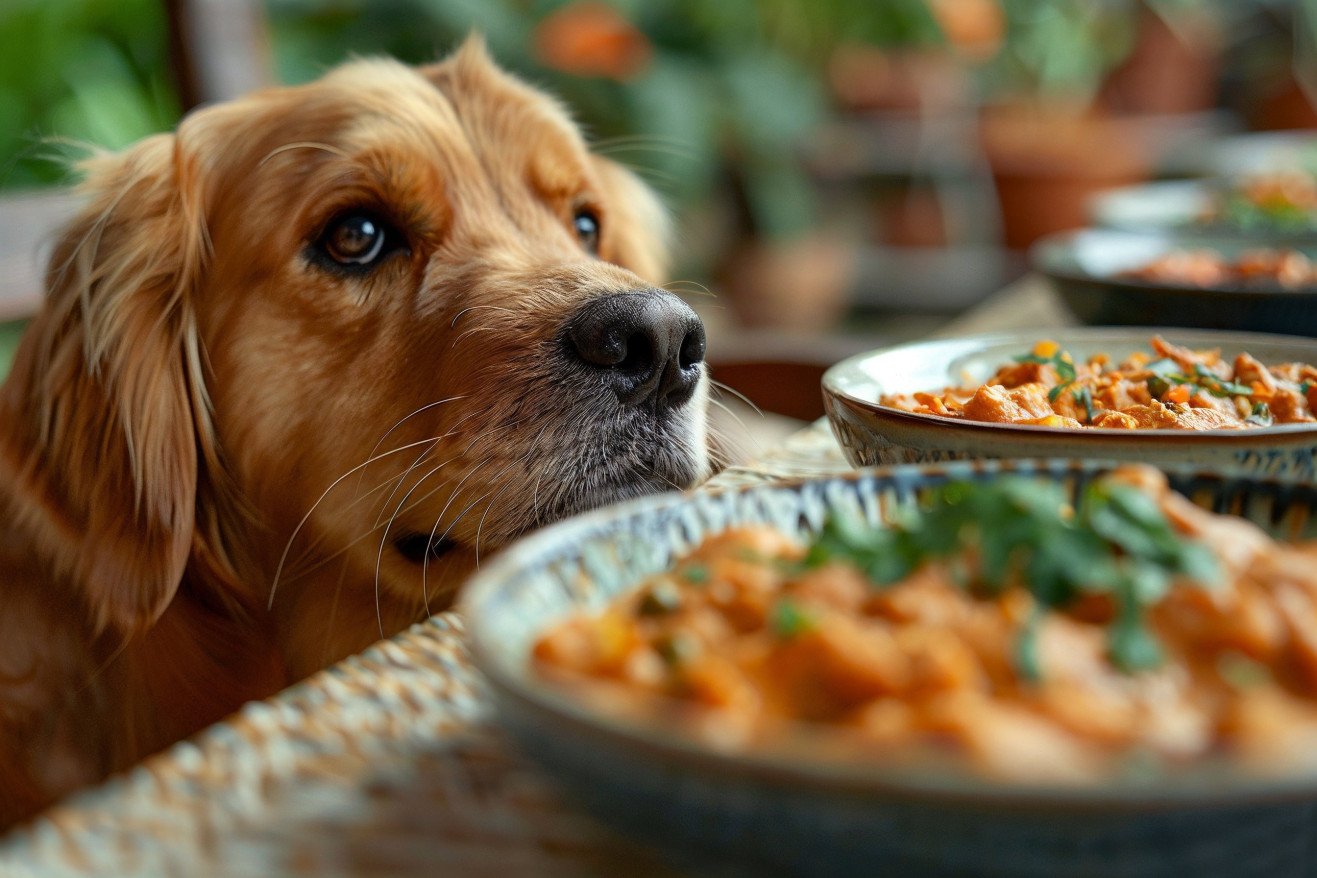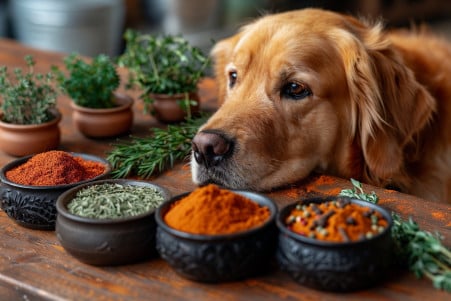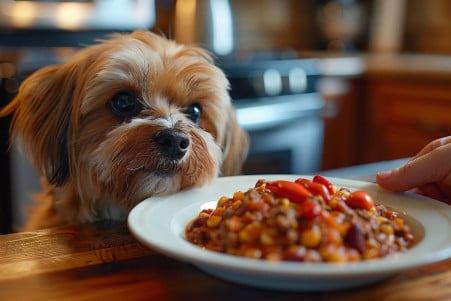Can Dogs Eat Curry? Unpacking the Risks of Spicy Foods for Canines
10 March 2024 • Updated 9 March 2024

If you love the taste of curry, you may be wondering if it’s OK to share some with your dog. Unfortunately, dogs cannot have curry due to the presence of garlic, onions, and spices, all of which are toxic to dogs. These ingredients can lead to a range of problems, including digestive issues, anemia, and more. As a result, it’s best to avoid giving your dog curry.
This article will use in-depth veterinary knowledge and nutritional information to explain why the individual components of curry are bad for dogs. We’ll look at the toxicological impacts of alliums and spices, the health risks associated with dogs eating them, and offer alternative dietary options for your dogs. By the end of this evidence-based article, you’ll know which foods to make sure you never give your dog to keep them safe and healthy.
Can dogs eat curry?
Garlic and Onions in Your Dog’s Curry
While garlic and onions add a delicious kick to many curries, they are both part of the allium family and can be toxic to dogs. Garlic, the most toxic allium, is about five times more toxic to dogs than onions, according to the Pet Poison Helpline.
The Pet Poison Helpline also warns that onions can be toxic to dogs. Both garlic and onions can cause oxidative damage to a dog’s red blood cells, which can lead to hemolytic anemia.
The oxidative damage is caused by thiosulfates and N-propyl disulfide in garlic and onions, according to PetMD. Symptoms of garlic and onion toxicity in dogs include vomiting, diarrhea, pale gums, lethargy, and an increased heart and respiratory rate. The PDSA adds that a reduced appetite and abdominal pain can also be signs of allium poisoning, and while they are rare, seizures can occur in severe cases.
If your dog has eaten curry that contains garlic and onions, it’s important to get them to the vet right away. Both PetMD and the PDSA say that early treatment can result in a good outcome. Dog owners should be aware of the signs of garlic and onion poisoning and be ready to act quickly if their dog accidentally eats something that contains these toxic ingredients.
The Harsh Reality: Curry Spices and Dog Health
While curry’s spicy flavor comes from a mix of spices, some of the spices used in curry are not good for dogs. For example, cayenne pepper and ground chilies, which contain capsaicin, can cause severe gastrointestinal upset in dogs, according to Goody Pet. These spices, which are delicious to humans, can cause dogs pain, bloating, gas, excessive thirst, and vomiting.
Dogs are especially sensitive to capsaicin, the spicy chemical in chilies. It can cause a burning sensation and even pain in their digestive tract, which can lead to diarrhea and nausea. In addition, Goody Pet warns that other spices used in curry, including cinnamon and cumin, can cause digestive upset if dogs consume them in large amounts.
If your dog eats spicy curry, keep a close eye on them. According to Our Fit Pets, vomiting and diarrhea can last for up to 24 hours. If your dog’s symptoms are severe or last longer than a day, take them to the vet immediately to avoid dehydration and other complications. When in doubt, always contact your vet if you think your dog has eaten something they shouldn’t have.
Ordering Off the Menu: Human Foods That Are Safe for Dogs
Of course, when it comes to feeding our pets human food, the most important thing is that we’re keeping them safe and healthy. Healthline recommends fruits like apples (without the seeds and core), blueberries, and watermelon (without the rind or seeds) because they’re full of vitamins and can be hydrating.
The American Kennel Club points out that vegetables like carrots and green peas are good for dogs because they’re full of fiber and other nutrients.
That said, there are some foods that people often think are safe for dogs but are actually dangerous, like grapes, raisins, and anything that contains xylitol. Make sure to ask your vet if you’re unsure, especially if you’re thinking about giving your dog something that’s high in fat or calories, as these can lead to gastrointestinal issues, according to Daily Paws.
When you do give your dog new foods, make sure to do so slowly so you can keep an eye out for any negative reactions. While these safe foods can be a fun way to mix up your dog’s diet, they don’t come with the risks associated with the spices and alliums that are often found in curry.
With that in mind, you can use these foods to give your dog a more varied and enjoyable diet while still making sure that they’re safe and healthy.
Potential Health Benefits of Dog-Safe Spices
While many of the spices found in curry are not safe for dogs, some, like turmeric, can have positive effects on your pet’s health when used properly. Dogs Naturally explains that turmeric contains curcumin, which has antioxidant and anti-inflammatory properties that can help your dog in a number of ways.
Turmeric has been shown to help with everything from arthritis to digestive problems. The recommended dosage for dogs is 15–20mg per pound of body weight, split into smaller doses that can be given throughout the day since curcumin is metabolized quickly.
That said, it’s important to be aware of the potential side effects of giving your dog turmeric. In addition to the fact that it can cause digestive upset if it’s given in high doses, both Spoiled Hounds and Purina point out that turmeric can interact with a number of medications, including anti-inflammatory and diabetes medications.
In addition, turmeric can cause staining due to its bright yellow color and should not be given to dogs that have gallstones or bile duct obstruction.
Before giving your dog turmeric or any other spice, make sure to talk to your vet to make sure that it’s safe for your dog, especially if your pet is on any medications. If your vet gives you the go-ahead, turmeric can be a great way to help your dog stay healthy and happy.
Final Thoughts: Canine Cuisine and Curry Concerns
To wrap up the article’s key takeaways, it is evident that curry can be harmful to dogs because of the ingredients it typically contains, including garlic, onions, and certain spices, which can lead to oxidative damage to red blood cells and digestive problems. Not only are these ingredients unhealthy for dogs, but they can also be toxic, potentially causing hemolytic anemia and gastrointestinal upset.
We have also explored dog-friendly options, showing that not all human foods are bad for our furry friends. Fruits and vegetables like apples, blueberries, carrots, and green peas can provide healthful vitamins and minerals without the risks associated with the harmful ingredients in curry. Furthermore, spices like turmeric may be beneficial to dogs in the right doses and with the guidance of a vet.
This investigation emphasizes the need to be careful about what we feed our dogs and to make their health and safety a priority. It also shows that we should always consult a professional before adding new items to our dogs’ diets and that we should choose ingredients that will help them thrive.
As good dog parents, we should make sure that the care we give our dogs through their food helps them live a long, healthy, and happy life.


